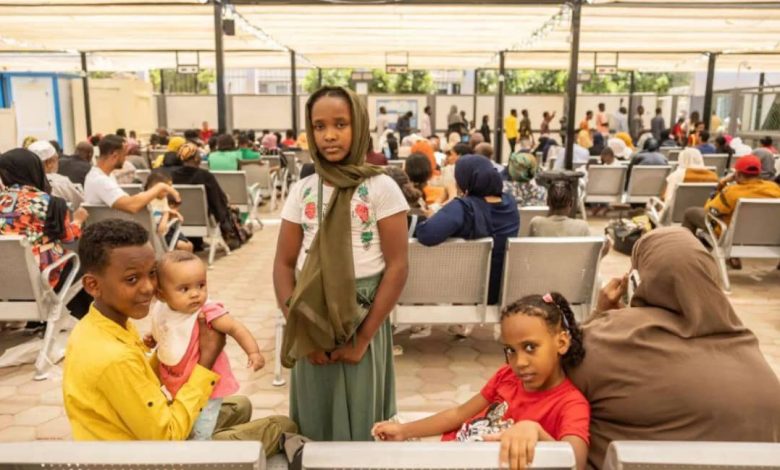Sudanese Minister of Transport: 140,000 Refugees Returned from Egypt

Sudan Events – Agencies
The Sudanese Ministry of Transport has revealed a massive influx of Sudanese refugees returning from neighboring countries, particularly across the border with Egypt, noting that 140,000 refugees have returned through the “Argeen” and “Ashkit” crossings, with an average of 30 to 40 public transport buses arriving daily.
Egypt is considered one of the largest hosts of Sudanese refugees fleeing the ongoing war for the past two years. According to reports, their number has exceeded one million refugees, out of four million who fled abroad.
Sudanese Minister of Transport, Abu Bakr Abu Al-Qasim, told Asharq Al-Awsat that the return of citizens through the border crossings is “progressing well,” and that authorities are working to resume operations on the river line connecting Egypt’s “Aswan” and Sudan’s “Wadi Halfa,” with one ferry expected to start operating within days and another to follow within a month.
The minister anticipated a doubling in the number of Sudanese refugees returning from all asylum countries, especially from Libya, South Sudan, Ethiopia, and Egypt, “following the victories achieved by the armed forces recently.”
Meanwhile, Sudan’s Consul in Aswan, Abdel Qader Abdullah, told Asharq Al-Awsat that about 40 public buses depart daily from Aswan to Sudan, in addition to other movements across the border through “smuggling,” and that the number of returnees will double after students’ exams and Eid al-Adha celebrations. He also noted that Egyptian authorities have “facilitated” the return of Sudanese without imposing any restrictions.
The consular official stated that about one million Sudanese refugees entered Egypt after the war began, with 700,000 entering officially and the rest through “smuggling” across the shared border.
He also revealed a decline in the number of people arriving from Sudan to Egypt, saying they now number no more than 100 people daily, mostly seeking medical treatment or visiting relatives. He highlighted several initiatives supporting Sudanese returning home, such as the “Brothers Initiative” (Sudanese-Egyptian), which has been supporting healthcare, education, and shelter efforts over the past two years.
International organizations have projected that around two million refugees could return to Khartoum within the next six months, revealing that 70,000 Sudanese have already returned from Egypt in recent weeks.
The large-scale return of Sudanese to their cities and towns comes despite the Minister of Health Haitham Mohamed’s call for families to delay returning to areas recaptured from the “Rapid Support Forces” until “cleansing and sanitization operations” are complete. Activists on social media supported the minister’s call, emphasizing the importance of caution to avoid health and environmental risks caused by the spread of corpses and unexploded ordnance.
Meanwhile, the death toll from the random artillery shelling carried out by the Rapid Support Forces (RSF) on the Sudanese city of El Fasher, capital of North Darfur State, rose to 47 civilians, including 10 women, according to a military media statement on Monday from the Sudanese army’s Sixth Infantry Division.
The RSF has been besieging El Fasher for months in an attempt to seize control, as it remains the last major city in Darfur under army control.
El Fasher is seen as a strategic target for the RSF, which seeks to tighten its grip on Darfur after the army retook control of the capital, Khartoum, last month.
Separately, military sources told Al Jazeera that RSF forces heavily shelled western El Fasher and the Abu Shouk camp to the north of the city early today.
Last week, the RSF launched a renewed assault on the city and two nearby camps for displaced people, Zamzam and Abu Shouk, resulting in over 400 deaths and the displacement of about 400,000 people, according to the United Nations.
Relief sources estimate that up to one million people were sheltering in these camps. The United Nations said that most of the displaced fled north to El Fasher or to the small town of Tawila, 60 kilometers westward.
UN Secretary-General spokesperson Stéphane Dujarric confirmed that the organization continues to receive horrifying reports from El Fasher and Zamzam camp involving killings, sexual violence, and mass displacement.
Dujarric stressed that the humanitarian needs in North Darfur are enormous.
He also mentioned that UN Under-Secretary-General for Humanitarian Affairs Tom Fletcher spoke separately by phone today with Sudanese army chief Abdel Fattah al-Burhan and RSF deputy leader Abdel Rahim Dagalo, noting their commitment to ensuring full access for aid deliveries.
The war between the Sudanese army and the RSF erupted on April 15, 2023, and as of this past Tuesday, it entered its third year, having killed tens of thousands and displaced 13 million people — what the United Nations describes as the world’s largest hunger and displacement crisis.
The conflict has also effectively divided the country: the army controls the center, north, and east, while the RSF controls almost all of Darfur and parts of the south with its allies.



